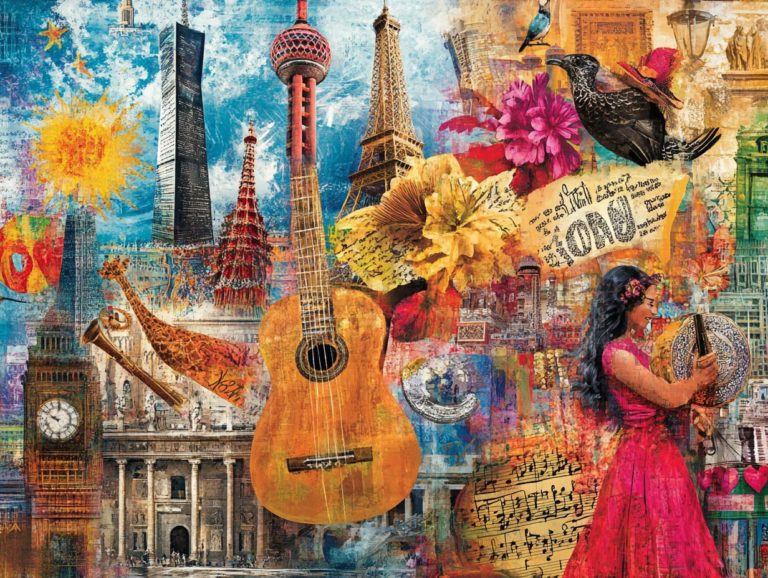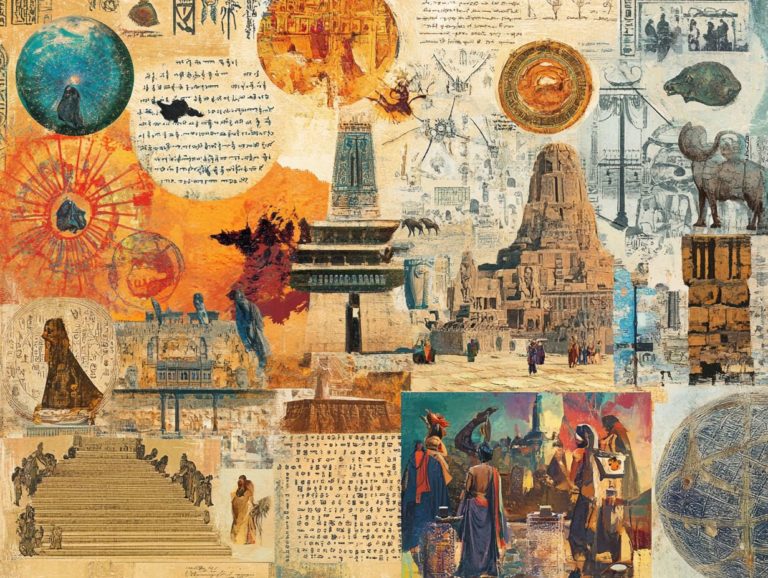5 ways language learning can foster cultural understanding
Language learning transcends mere vocabulary and grammar; it acts as a bridge to the intricate tapestry of cultures that enrich our world. Don’t miss out on the chance to enrich your life through language!
This exploration reveals five compelling ways that acquiring a new language can dismantle barriers, foster empathy, and deepen your appreciation for diverse perspectives.
By recognizing cultural nuances and forging meaningful connections, you’ll discover how language can profoundly transform individual experiences and cultivate a sense of global citizenship.
Start your exciting journey to unlock the invaluable benefits of language in nurturing cultural understanding.
Contents
- Key Takeaways:
- 1. Breaking Down Barriers
- 2. Learning About Different Perspectives
- 3. Appreciating Cultural Nuances
- 4. Building Empathy and Respect
- 5. Creating Opportunities for Communication and Connection
- Why Is Language Learning Important for Cultural Understanding?
- How Can Language Learning Help Break Down Cultural Stereotypes?
- What Are Some Examples of Cultural Nuances That Can Be Learned Through Language?
- How Can Language Learning Help Foster Empathy and Respect for Other Cultures?
- What Are Some Ways Language Learning Can Facilitate Communication and Connection with Other Cultures?
- How Can Language Learning Help Individuals Become Global Citizens?
- Frequently Asked Questions
- What are the benefits of learning a new language?
- How can language learning foster cultural understanding?
- Can language learning help break down cultural barriers?
- What are some practical ways language learning can foster cultural understanding?
- How can learning a language promote respect for diversity?
- Is it important to learn about a culture when learning a new language?
Key Takeaways:
Language learning promotes understanding and respect between cultures, enhancing your appreciation for different perspectives.
Learning different perspectives through language can increase cultural awareness and appreciation.
Specific cultural details can be understood and respected through language learning.
1. Breaking Down Barriers
Breaking down barriers in communication is crucial for cultivating relationships in our increasingly multicultural society. Effective communication skills can bridge gaps between diverse perspectives and enhance understanding among individuals from different cultural backgrounds.
Language acquisition plays a pivotal role in this journey, giving you the power to express your thoughts and feelings in a shared language, which minimizes misunderstandings.
In ESL education, innovative teaching strategies that emphasize real-world applications and interactive practices significantly facilitate this learning process. These methods not only promote language skills but also foster cultural appreciation, allowing you to navigate social nuances with greater ease.
Understanding the cultural influences on communication styles can profoundly shape societal behaviors. This awareness creates fairer opportunities in the global job market, where bilingualism and cultural competence are increasingly valued, giving you an edge in today s interconnected world.
2. Learning About Different Perspectives
Understanding different perspectives is essential for cultural awareness and nurtures your capacity for empathy, allowing you to appreciate and navigate the intricacies of diverse cultures through meaningful language education.
By immersing yourself in various linguistic environments and utilizing enriching learning materials, you can significantly deepen your cultural insights. Engaging with authentic resources such as films, literature, and interactive experiences illustrates how language courses enhance cultural understanding, offering a nuanced grasp of societal norms, values, and traditions.
This exposure not only broadens your worldview but also fosters personal growth as you learn to embrace and respect differing viewpoints. Integrating diverse cultural elements into your education is vital.
It equips you with the skills necessary to thrive in an increasingly interconnected world, encouraging critical thinking and open-mindedness.
3. Appreciating Cultural Nuances
Appreciating cultural nuances is essential for mastering a foreign language and elevating your language skills. Understanding the subtle differences in communication and expression can significantly enhance your language skills and emotional intelligence.
For instance, in many Asian cultures, indirect communication is often favored, with meaning woven into tone and context rather than laid out in explicit statements. This subtlety demands that you read between the lines, fostering a deeper emotional intelligence, which is the ability to understand and manage your own emotions as well as understand the emotions of others, and a richer understanding of interpersonal dynamics.
The richness that cultural diversity brings transforms the journey of language learning into something far beyond mere vocabulary and grammar; it’s about appreciating shared histories and traditions.
Engaging with local customs, idioms, and gestures allows you to elevate a language from mere words to a vibrant tapestry that reflects the essence of a community. This approach not only makes your interactions more meaningful but also fosters genuine connections.
4. Building Empathy and Respect
Empathy and respect are vital in today s diverse world. Language instruction is a powerful way to develop these qualities through meaningful communication.
Use different teaching methods to create an inclusive environment. This approach helps learners appreciate the richness of various cultures.
For example, group projects that pair students from different backgrounds encourage sharing personal stories. Language exchange programs provide fantastic opportunities for real-life experiences.
Connecting learners with native speakers goes beyond textbooks. Through dialogue, participants gain a deep understanding of each other’s traditions.
These interactions not only break language barriers but also create lasting friendships based on cultural appreciation.
5. Creating Opportunities for Communication and Connection
Creating chances for communication is crucial in our globalized world. Engaging in language practice through various methods boosts your communication skills.
Explore platforms like online courses and immersive language exchanges. They can transform your journey of personal growth.
These platforms make learning a language easier and encourage meaningful interactions. Learning languages builds confidence and broadens your personal and professional opportunities.
Investing time in language learning enriches your life. It equips you to thrive in an interconnected world.
Why Is Language Learning Important for Cultural Understanding?
Language learning is key to understanding different cultures, and 5 ways movies enhance language and cultural understanding can deepen your appreciation of diverse practices vital for thriving in a multicultural society.
Immersing yourself in another language improves your thinking skills and provides insights into various communities’ values. Engaging with music, literature, and food lets you experience culture firsthand.
Participating in community events or language exchanges boosts fluency while connecting you with diverse people. This fosters empathy and collaboration.
Active engagement creates a more inclusive society where diverse perspectives are celebrated.
How Can Language Learning Help Break Down Cultural Stereotypes?
Language learning helps break down stereotypes by fostering empathy. To enhance your experience, consider exploring 7 ways to integrate language learning into daily life, as it allows you to engage in cross-cultural communication with an open mind.
Consider programs that incorporate storytelling from various backgrounds; they highlight shared human experiences. Language exchange initiatives let you converse directly with native speakers.
These initiatives often include role-playing, helping you understand different cultures on a deeper level. You gain new vocabulary and insights into social nuances, promoting a worldview that embraces diversity.
What Are Some Examples of Cultural Nuances That Can Be Learned Through Language?
Cultural nuances, such as idioms, gestures, and social norms, profoundly shape your communication skills and emotional intelligence. Embracing these elements offers you a richer language experience that celebrates the cultural diversity inherent in the language you are learning.
Take the Japanese language, for instance. It s replete with subtle expressions that convey respect and hierarchy, like the use of honorifics. Depending on your relationship with the listener, these honorifics can transform the meaning of a sentence entirely.
Similarly, in Portuguese, the phrase “dar uma m o,” which translates to “to lend a hand,” goes beyond mere assistance; it embodies a deeper sense of connection and camaraderie.
These examples highlight how grasping cultural nuances can significantly enrich your linguistic proficiency and your relationships with others. By recognizing and appreciating these differences, you can elevate your communication skills, making you more effective in conveying intent and fostering understanding across diverse cultural landscapes.
How Can Language Learning Help Foster Empathy and Respect for Other Cultures?
Language learning cultivates empathy and respect for diverse cultures by encouraging you to engage with various worldviews and practices. Discovering 7 ways to learn a language through cultural exchange not only enhances your communication skills but also deepens your cultural understanding.
Such an approach invites you to immerse yourself beyond mere vocabulary and grammar. You can explore the intricate tapestries of customs, traditions, and stories that define different communities.
As you navigate literature, music, and films from various cultures, you’ll practice perspective-taking, a crucial skill for grasping others emotions and experiences.
For example, participating in role-playing activities lets you step into the shoes of individuals from different backgrounds, fostering a richer understanding of global issues.
Collaborative projects involving group discussions about cultural practices will further enhance your ability to listen actively and respond with respect, creating a classroom atmosphere that thrives on empathy.
What Are Some Ways Language Learning Can Facilitate Communication and Connection with Other Cultures?
Language learning gives you the power to communicate and connect with diverse cultures by providing the essential skills for meaningful engagement. This not only opens doors to global opportunities but also enriches your intercultural interactions.
By embracing experiences where you fully engage with another culture like studying abroad or participating in cultural exchange programs you can practice your language skills in real-world settings. This experience deepens your understanding of local customs and traditions, making your learning journey vibrant.
Engaging in language exchanges, where you converse regularly with native speakers, cultivates a reciprocal learning environment and strengthens your relationships with others. These connections enhance not just your personal experiences but also contribute to broader community dialogues, fostering empathy and cooperation among varied groups.
As you become more culturally aware, you ll cultivate a sense of belonging and shared identity that bridges gaps and nurtures harmonious relationships, both locally and internationally.
How Can Language Learning Help Individuals Become Global Citizens?
Language learning gives you the power to become a global citizen, fostering cultural understanding, developing empathy, and facilitating personal growth. To enhance this journey, consider these 7 tips for balancing language and culture, which allow you to navigate and contribute positively to our interconnected world.
Embarking on this transformative journey enhances your communication skills while nurturing a deep appreciation for diverse perspectives. As you immerse yourself in different languages, you uncover the rich history, traditions, and values of various cultures, cultivating a profound sense of respect and curiosity.
Mastering a new language sharpens your critical thinking and adaptability, preparing you to tackle global challenges with creativity and insight. Ultimately, these attributes equip you to engage meaningfully with individuals from all walks of life, promoting cooperation and shared solutions in an ever-evolving environment.
Frequently Asked Questions
What are the benefits of learning a new language?
Learning a new language can open up opportunities for communication, travel, and personal growth. To make the process more engaging, consider exploring ways to incorporate games in language learning, which also allows for a deeper understanding and appreciation of different cultures.
How can language learning foster cultural understanding?
By learning a new language, individuals are exposed to unique customs and traditions. This exposure can lead to greater understanding and respect for diversity.
Can language learning help break down cultural barriers?
Learning a language helps break down cultural barriers by enabling communication. This promotes empathy and understanding between different cultures, and you can enhance this experience with 5 ways to experience local culture while learning.
What are some practical ways language learning can foster cultural understanding?
Through immersion programs, individuals can dive deep into a new culture.
Learning about the history and cultural influences behind a language enriches the experience.
Engaging in conversations and interactions with native speakers enhances understanding.
Traveling to different countries allows individuals to use the language in real-life situations.
Participating in cultural events and activities associated with the language adds depth to the learning experience.
How can learning a language promote respect for diversity?
Learning a new language exposes individuals to different ways of thinking and communicating. Imagine seeing the world through new eyes!
Is it important to learn about a culture when learning a new language?
Understanding the culture is crucial. It helps communicate effectively and shows respect for the people.





